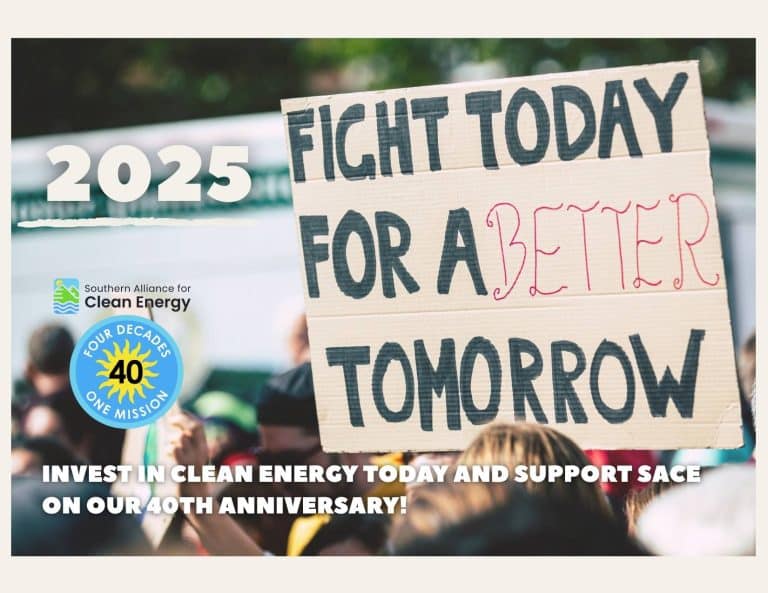 Late on the evening of January 24, the board of directors at Cobb EMC made an unprecedented about-face, and voted to freeze the EMC’s funding for two coal-fired power plants: Plant Washington and Plant Ben Hill. Without their biggest investor, these coal plants are now more on the ropes than ever.
Late on the evening of January 24, the board of directors at Cobb EMC made an unprecedented about-face, and voted to freeze the EMC’s funding for two coal-fired power plants: Plant Washington and Plant Ben Hill. Without their biggest investor, these coal plants are now more on the ropes than ever.
A consortium of utility co-ops (Electric Membership Corporations or EMCs) known collectively as POWER4Georgians, LLC (P4G), has been promoting the projects since 2008. Now P4G is down to four members (originally there were nine), as Cobb EMC is the fifth co-op to pull out of P4G and the coal plants. It’s time for the rest to follow Cobb EMC’s lead; hopefully, Snapping Shoals EMC, Central Georgia EMC, Washington EMC, and Upson EMC can now see the light and will stop spending money on this dead-end project.
 In 2008, the original nine EMCs represented 741,000 customers across Georgia; the remaining four represent only about 167,000 – a rough way to clearly visualize that support for the plants has dwindled to a mere 23% of what it once was (see pie chart).
In 2008, the original nine EMCs represented 741,000 customers across Georgia; the remaining four represent only about 167,000 – a rough way to clearly visualize that support for the plants has dwindled to a mere 23% of what it once was (see pie chart).
With this bold decision, the newly elected directors at Cobb EMC acted to protect their members from further uncontrolled spending. Cobb EMC had already funneled over $13 million into the Plant Washington project, and the members have yet to see those expenses justified. Four of the original nine partners retreated in April of 2009, citing cost concerns and pending environmental regulations; similarly, in its press release, Cobb EMC said its future capacity needs didn’t justify further spending on a new power plant, and that new EPA regulations, which make coal plant operators control more of their air and water pollution, made constructing new facilities too financially risky.
 Southern Alliance for Clean Energy has been saying for years that the economics don’t stack up on the new coal proposals and that new coal is bad deal for Georgia, but until recently it seemed like Cobb EMC’s leadership was asleep at the wheel. Their decision is a testament to the dogged persistence of Cobb EMC members who held their utility co-op accountable and ousted directors they felt were irresponsible about this project and many other management issues.
Southern Alliance for Clean Energy has been saying for years that the economics don’t stack up on the new coal proposals and that new coal is bad deal for Georgia, but until recently it seemed like Cobb EMC’s leadership was asleep at the wheel. Their decision is a testament to the dogged persistence of Cobb EMC members who held their utility co-op accountable and ousted directors they felt were irresponsible about this project and many other management issues.
Newly elected Cobb EMC board member David Tennant told the Marietta Daily Journal[link] about the board’s conversation with plant developer and advocate Dean Alford:
“We asked him a lot of questions, and in my mind, a lot of questions still weren’t answered. Our questions were very substantive, and even some existing board members were asking questions. (Alford) gave his best case for why he thought the plant is worth going forward with, but at the end of the day, we just didn’t see it his way. Things have changed.”

Alford himself is a concern for many critics of the coal plants. He worked for now-indicted Dwight Brown as a Cobb Energy VP, and kept his job even though his projects lost about $11 million over 5 years. Alford’s company, former Cobb Energy subsidiary Allied Energy Services, helped create P4G, then got a no-bid contract to handle coal plant development despite never having built a coal plant before. Cobb EMC’s new directors have indicated they will conduct a forensic audit to investigate the business arrangements behind P4G, and other EMC affairs.
SACE and our partners in the Georgians for Smart Energy coalition, including Sierra Club, the Fall-line Alliance for a Clean Environment, Environment Georgia, and many others, continue to advocate that all the EMCs in P4G need to conduct a thorough analysis of their needs for new generation in light of reduced power demand trends, as well as a comprehensive assessment of alternative options including energy efficiency, renewables like solar and sustainable biomass, and natural gas. Cobb EMC has issued an RFP to assess the realm of options to meet their future energy needs and fortunately, Plant Washington will not be on the list of possible sources of power.
SACE applauds the board of directors at Cobb EMC for being bold and decisive on this matter, and we look forward to working with all power providers in Georgia to build a clean energy future that protects citizen health and our precious environmental resources.

